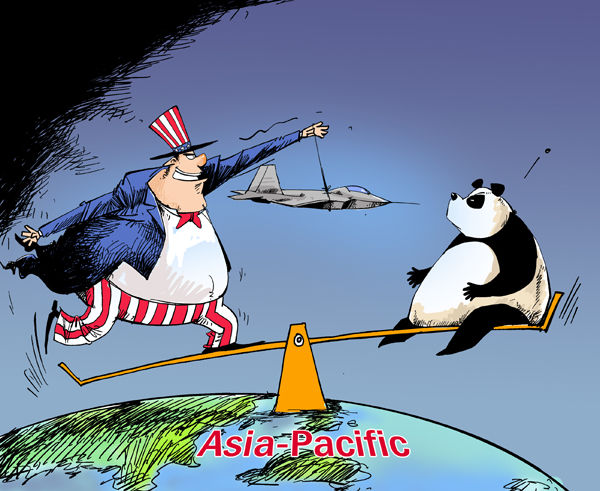New power relations benefit both China and the US
- By Pang Zhongying
 0 Comment(s)
0 Comment(s) Print
Print E-mail China.org.cn, July 18, 2013
E-mail China.org.cn, July 18, 2013
A new type of international relations, and a new type of major power relations in particular, was first put forward by China based on the current global trend of multi-polarization.
|
|
|
Striking an imbalance [By Gou Ben/China.org.cn] |
Unsurprisingly, the U.S. still sees many people unwilling to face the ongoing global trend of multi-polarization. However, this fact won't disappear because they refuse to see it; multi-polarization means there are several countries which hold roughly the same level of power, a level no one can determine without negotiating with the others. The multi-polar trend exists both on international and regional levels: the EU and its member countries, plus Russia and the U.S., compose the major power block in Europe; Israel, Turkey, Iran, Saudi Arabia and Egypt form the major powers of the Middle East.
Despite each of them facing different domestic challenges, the international importance of newly emerged superpowers - Russia, Brazil, India, China and the South African countries - has been gradually consolidated. As the West is caught in a financial and social crisis, the growth of the newly emerged powers has become relatively more prominent.
One risk the multi-polar trend may face is that without timely management, it may lead to instability or even crisis within the international system. To build new type of major power relations is China's proposal to prevent a clash between newly emerged countries and existing big powers.
Globalization has entailed a series of global issues. The issues of energy security and internet security relate to all countries, be it directly or indirectly. How can we deal with these challenges? According to some Americans, energy independence and cyber war are the way to energy security and internet security. In reality, however, such a mentality and policy will only intensify competition.
China's conception of building a new type of major power relations aims to solve global issues through new methods and systems. Even in this era of omnipresent globalization, the U.S. seemingly adheres to a Cold War-style mindset in solving the current issues in international relations; yet this type of behavior will only lead to more predicaments. The U.S. rebalancing strategy in the Asia Pacific region has hindered the region's international cooperation and sabotaged the multilateralism based on equality and cooperation.
In addition to the so-called "rise of China and decline of the U.S.," there are even more profound changes taking place within the Asia Pacific region.







Go to Forum >>0 Comment(s)